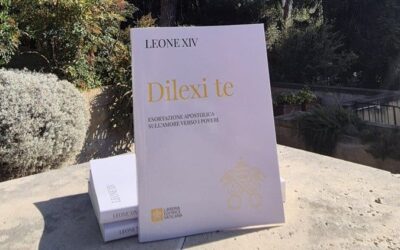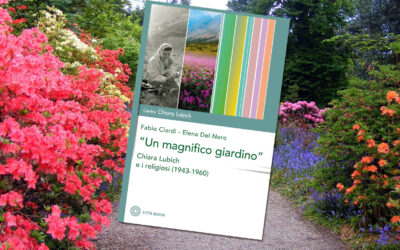 “Dearest all, The 1986-87 year is an important one for the Catholic world. In fact, preparations are being made to celebrate the Synod of Bishops which will be held in the fall, concerning the ‘Vocation and mission of the laity in the Church and in the world twenty years after the Second Vatican Council.’ It is an important year for the Catholic laity, but also – I think – for other Christians in whose Churches the role of the laity is often stressed. We too, who desire to be committed Christians, are preparing for this Synod through prayer, which must never be lacking, and through the work which is asked of us. But, ‘who is the layperson?’ This is a recurring question in the Church today. How can the layperson be identified or defined? Many people are trying to give the answer. In fact, no one would really want to define the layperson in terms that show what the lay person is not: a person who is neither a priest, nor a religious. Instead, one would want to establish who the layperson is. For this reason we would like to offer a contribution to the study of this topic, by affirming what someone might call Columbus’s egg: the layperson is a Christian. As such, laypersons are followers of Christ and His Gospel. For this reason they must fully live what Jesus wants from them, and to work first of all toward enhancing the Kingdom of God, toward building the Church. Given that they have the possibility of being in the midst of the world, it is there where they will bring the light of the Gospel, passing its effect onto all things. This is who the layperson is for us. A well formed follower of Christ, who has the two-fold task of building the Church and to Christianize the world. We laypersons of the Focolare find ourselves reflected very well in this image of a layperson. In fact, the Focolare has on one side a spiritual aspect, if we can use the expression, where we work in order that Christ might grow in us and among us, and therefore build the Church; and then an aspect that is more human and concrete, where we work toward permeating the various sectors of society with the spirit of Christ. We strongly identify ourselves with this type of layperson, and because of this we feel we are finely tuned to what the Second Vatican Council has defined in this regard. We identify ourselves with this definition and we would like this year to always improve in living our specific vocation as laypersons so that we too can give our contribution to the Synod. Let’s try to be true laypersons of the Church, meaning authentic followers of Christ, who live His words and what the rest of Sacred Scripture proposes. We have a splendid Word of Life for this month which underlines what we lived last month on reciprocal love. It tells us: “Accept one another, then, as Christ accepted you, for the glory of God” (Rm 15:7). In putting into practice this Word of Life among us, we will maintain firm the basis upon which the Work of Mary, which is Church, is built. In putting this Word into practice with other Christians, in places where we can still find ourselves working within ecclesial structures, we will give our specific contribution to the development of the Church. Living these words in the world of the family and in the various sectors of society, we will place the most important basis for being able to attain the Christian renewal of laws and structures. The Word of Life is for everyone: laypersons, priests and religious. Let’s put it into practice in all our respective fields of service. Let’s accept each neighbour as Christ has accepted us. He has accepted us, and accepts us each day and each hour we call upon Him. Whoever we are, sinners or saints, young or old, beautiful or ugly, healthy or sickly, He always accepts all of us. And we are so sure of His acceptance, of His forgiveness, and of His hospitality, that it doesn’t even pass our minds for a moment that it could be otherwise. Let’s act accordingly in regard to our neighbours. That they may always find us with open hearts, always available for them, always ready to receive them. Let’s live in this way. And may it be for the glory of God.” Chiara Lubich, Rocca di Papa, 11 December 1986 Published in “On the Holy Journey”, New City Press, 1988
“Dearest all, The 1986-87 year is an important one for the Catholic world. In fact, preparations are being made to celebrate the Synod of Bishops which will be held in the fall, concerning the ‘Vocation and mission of the laity in the Church and in the world twenty years after the Second Vatican Council.’ It is an important year for the Catholic laity, but also – I think – for other Christians in whose Churches the role of the laity is often stressed. We too, who desire to be committed Christians, are preparing for this Synod through prayer, which must never be lacking, and through the work which is asked of us. But, ‘who is the layperson?’ This is a recurring question in the Church today. How can the layperson be identified or defined? Many people are trying to give the answer. In fact, no one would really want to define the layperson in terms that show what the lay person is not: a person who is neither a priest, nor a religious. Instead, one would want to establish who the layperson is. For this reason we would like to offer a contribution to the study of this topic, by affirming what someone might call Columbus’s egg: the layperson is a Christian. As such, laypersons are followers of Christ and His Gospel. For this reason they must fully live what Jesus wants from them, and to work first of all toward enhancing the Kingdom of God, toward building the Church. Given that they have the possibility of being in the midst of the world, it is there where they will bring the light of the Gospel, passing its effect onto all things. This is who the layperson is for us. A well formed follower of Christ, who has the two-fold task of building the Church and to Christianize the world. We laypersons of the Focolare find ourselves reflected very well in this image of a layperson. In fact, the Focolare has on one side a spiritual aspect, if we can use the expression, where we work in order that Christ might grow in us and among us, and therefore build the Church; and then an aspect that is more human and concrete, where we work toward permeating the various sectors of society with the spirit of Christ. We strongly identify ourselves with this type of layperson, and because of this we feel we are finely tuned to what the Second Vatican Council has defined in this regard. We identify ourselves with this definition and we would like this year to always improve in living our specific vocation as laypersons so that we too can give our contribution to the Synod. Let’s try to be true laypersons of the Church, meaning authentic followers of Christ, who live His words and what the rest of Sacred Scripture proposes. We have a splendid Word of Life for this month which underlines what we lived last month on reciprocal love. It tells us: “Accept one another, then, as Christ accepted you, for the glory of God” (Rm 15:7). In putting into practice this Word of Life among us, we will maintain firm the basis upon which the Work of Mary, which is Church, is built. In putting this Word into practice with other Christians, in places where we can still find ourselves working within ecclesial structures, we will give our specific contribution to the development of the Church. Living these words in the world of the family and in the various sectors of society, we will place the most important basis for being able to attain the Christian renewal of laws and structures. The Word of Life is for everyone: laypersons, priests and religious. Let’s put it into practice in all our respective fields of service. Let’s accept each neighbour as Christ has accepted us. He has accepted us, and accepts us each day and each hour we call upon Him. Whoever we are, sinners or saints, young or old, beautiful or ugly, healthy or sickly, He always accepts all of us. And we are so sure of His acceptance, of His forgiveness, and of His hospitality, that it doesn’t even pass our minds for a moment that it could be otherwise. Let’s act accordingly in regard to our neighbours. That they may always find us with open hearts, always available for them, always ready to receive them. Let’s live in this way. And may it be for the glory of God.” Chiara Lubich, Rocca di Papa, 11 December 1986 Published in “On the Holy Journey”, New City Press, 1988
Be rich in mercy
Be rich in mercy




0 Comments